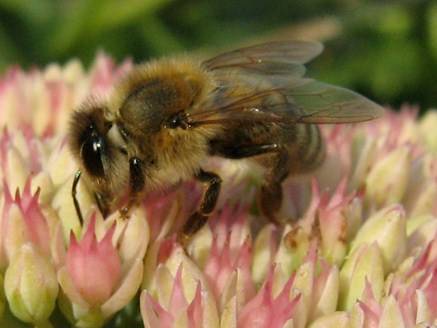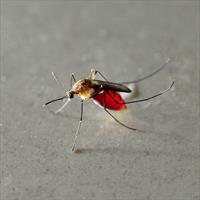
Any insect or spider can cause problems if they bite or sting your pet. A bite or sting can cause swelling, redness, and itching.
Some animals can have an allergic reaction to a sting or bite that may result in a range of symptoms:
- mild to severe hives,
- facial swelling,
- vomiting,
- difficulty breathing,
- or even collapse.
Some spider bites can lead to extensive skin necrosis (skin death) which may need treatment or surgery.
Contact a veterinarian right away if your pet is showing signs of an allergic reaction. Reactions can be severe and may require emergency treatment.
What to Do:

European honey bee courtesy of Natalie Rowe
- If the stinger can be found, scrape it out with a credit card or other stiff material. Alternatively, use tweezers by grasping the stinger, which is located below the venom sac. Studies have shown that speed is of the essence in removing the stinger. If the only way is to pinch it and remove it, then do so. You'll do more good than harm and you'll get the stinger out faster. Don't worry about squeezing more venom into the area - this has been disproven.
- Apply cool compresses to the area 3-4 times daily for 3-4 days.
- To help neutralize some of the acidic venom, apply a paste mixture of baking soda and water to the sting area.
- Prevent your pet from licking at the area by using an Elizabethan collar (cone) to prevent further trauma to the area.
- In short-faced/brachycephalic breeds like pugs, boxers, etc., facial swelling can lead to damage to the eyes. Have your veterinarian examine your pet and prevent rubbing on carpet, furniture, etc.
What NOT to Do:
Mosquito_Canto

Mosquito
- Do not administer any medications without first contacting your veterinarian or a veterinary emergency hospital. The veterinarian may need to examine your pet before recommending medications.
Browse the complete Veterinary Partner First Aid collection.
VIN News Service commentaries are opinion pieces presenting insights, personal experiences and/or perspectives on topical issues by members of the veterinary community. To submit a commentary for consideration, email news@vin.com.